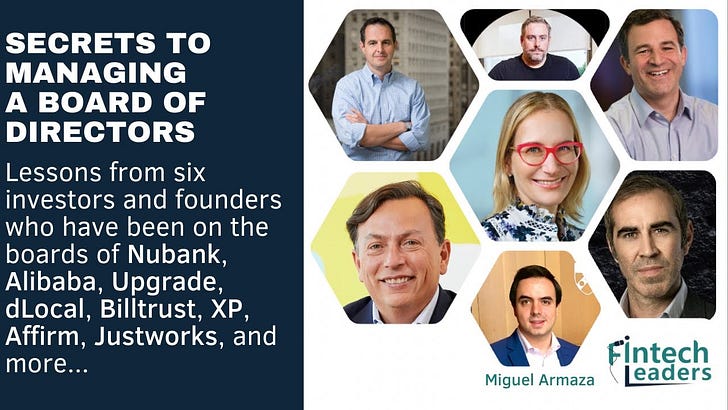This article is part of Fintech Leaders, a newsletter with 57,000+ dreamers, entrepreneurs, investors, and students of financial services. I invite you to share and sign up! And, if you enjoy this conversation, please consider leaving a review on Apple Podcasts, Spotify, or wherever you get your shows so more people can learn from it.
Today I sit down with Billy Libby, CEO/Co-Founder at Upper90 and Conor Witt, Vice President at Upper90. Upper90 is a hybrid fund that invests credit and equity in early-stage businesses.
Launched in 2018, Upper90 has over $1.1B in AUM and has backed fintech companies like Thras.io, Octane Lending, Mundi, and many more.
In this episode, we discuss:
Combining equity and debt underwriting under the same roof and why Billy believes Venture Capital financing needs to evolve
"if you look at a public company, it's something like 60/40 debt to equity. If you look at their balance sheet. If you look at the Bessemer ‘Cloud 100 index’, which is a good representation of the top VC-backed companies. I think it's 98% equity / 2% debt…"
Changing Landscape of Startup Financing: While the venture capital market has grown significantly, it hasn't evolved to meet the diverse financing needs of startups. Most public companies operate with a 60-40 debt-to-equity ratio. In contrast, top VC-backed companies, as represented by the Bessemer Cloud 100 index, show a staggering 98% equity to 2% debt ratio.
The Power of Data in Modern Business: The ubiquity of data has led to the hyper-personalization of experiences in our daily lives, from Instagram ads to Netflix home screens. Yet, the methods by which companies secure financing remain largely unchanged, presenting an inconsistency in the way data-driven insights are applied.
Shift towards Alternative Capital Sources: In the past, equity was relatively cheap, leading many startups to overlook credit options. However, the current landscape indicates a rising cost of equity, prompting a herd mentality. As a result, founders are increasingly seeking alternative capital sources, making businesses like Upper90 much more relevant.
What they’ve learned from working with the best credit-driven companies in the market and what great founders have in common
“One thing that I continue to remind myself is, things are never as good as you expect, if you think back to 2021, and are probably never as bad as you expect, which is today.”
Experienced founders, particularly those who have already launched multiple startups, are becoming more discerning about their investors. They prioritize optionality and are more strategic about their balance sheet, considering a mix of equity and debt. In sectors like FinTech and sustainable investing that require substantial capital expenditure, understanding that capital has become a commodity is vital. These founders are less focused on prestige or appearing in the front page of investment publications, but instead, they focus more on tangible capital market services, like tax considerations and hiring solutions.
Venturing outside the US and why Upper90 sees a ton of opportunity in places like Latin America
“You really have to work with local partners, because you don't know what you don't know.”
Importance of Local Expertise: When investing outside of the U.S., partnering with local firms is essential. Libby emphasizes that understanding regional nuances can make or break an investment, and stresses the importance of collaborating with firms with strong local domain knowledge. This approach minimizes potential risks and blind spots that can arise in unfamiliar territories.
Technology's Role in Risk Mitigation: Billy also mentions the example of Mundi, an Upper90 portfolio company that aids Latin American small businesses exporting to the U.S. The integration of technology tracks goods at every stage, from production to delivery, ensuring transparency and trust. Despite the geographical origin of the goods or services (e.g., Latin America), the actual risk can be based elsewhere, like the U.S., thanks to technology. This shifts the collateral, reducing risk and addressing working capital challenges.
The Need for Infrastructure and Scale: The intricate nature of international investing demands more than just capital. Firms need the infrastructure to understand and manage their portfolios deeply. Upper90, despite having a vast $1.5B portfolio, maintains a robust team, ensuring they can monitor, validate, and provide real-time insights. This model contrasts with other firms that operate with smaller teams, potentially missing crucial details. Libby emphasizes the importance of being adequately staffed and prepared, especially in an era where challenges and refinancing complexities are more prevalent.
How electronic and quantitative trading in Wall Street led Billy to fintech and venture capital… and a lot more!
“I started my career in 2003 in electronic trading - many people think of that as quantitative trading. And a lot of people ask, how did you go from that world, to the tech investing world? And I think the bridge is FinTech in a lot of ways…”
Want more podcast episodes? Join me and follow Fintech Leaders today on Apple, Spotify, or your favorite podcast app for weekly conversations with today’s global leaders that will dominate the 21st century in fintech, business, and beyond.
Previous Episodes You May Enjoy:
Video Highlights You Will Definitely Like:
Miguel Armaza is Co-Founder & Managing General Partner of Gilgamesh Ventures, a seed-stage investment fund focused on fintech in the Americas. He also hosts and writes the Fintech Leaders podcast and newsletter.



























Share this post